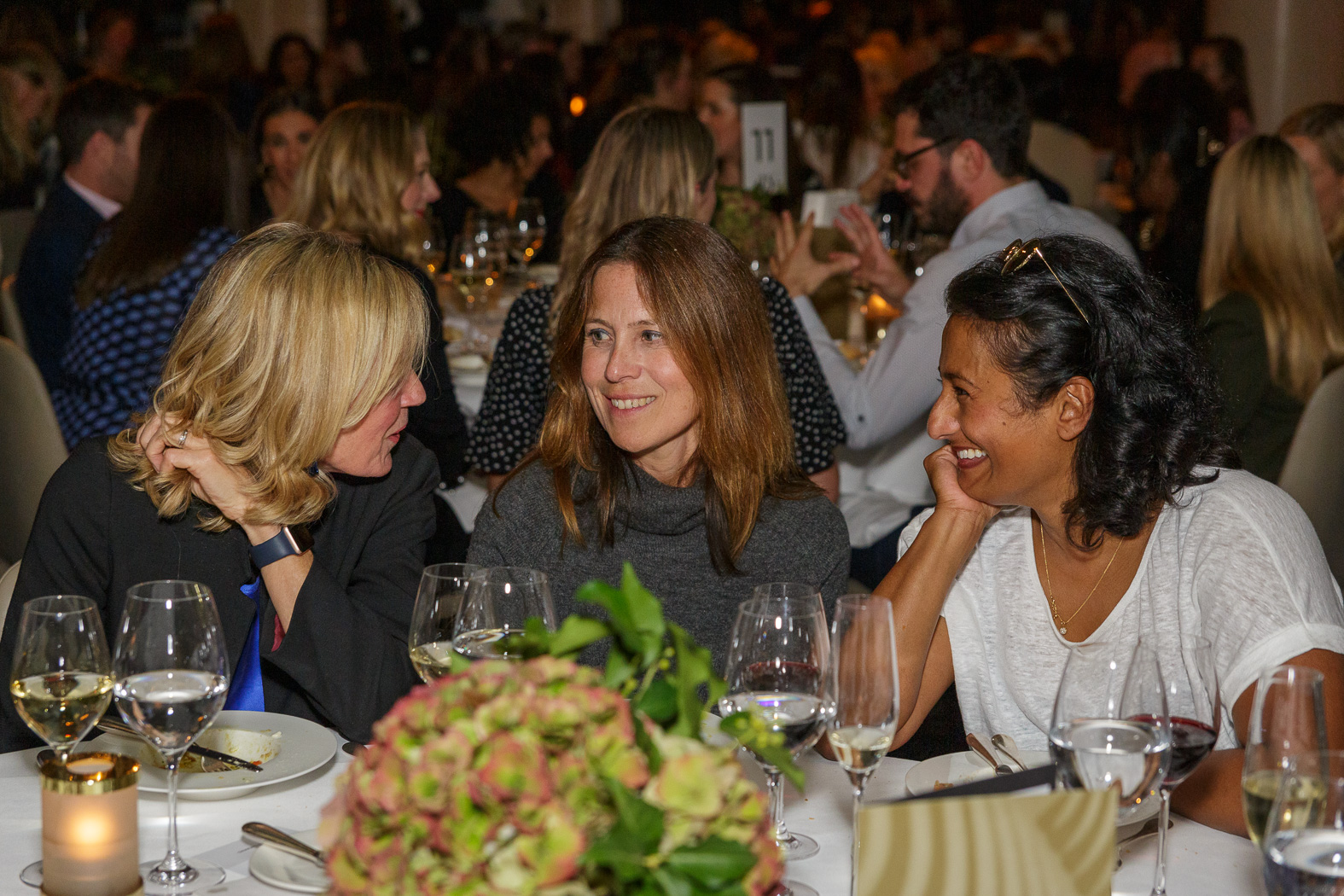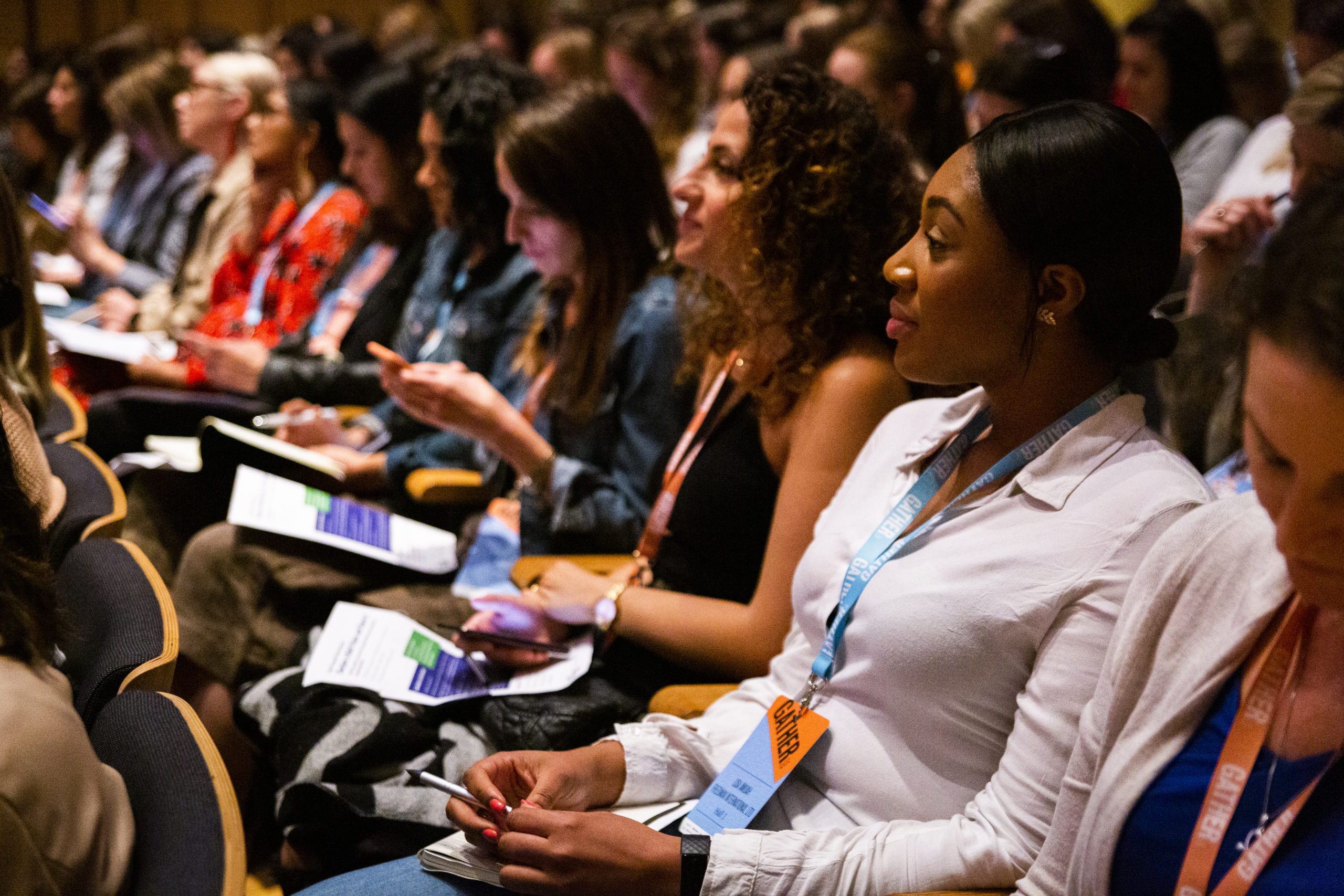- 1920s
In the 1920s…
- First women MPs elected for the Labour and Liberal parties
- Women cast off their corsets and ‘shingled’ their hair
- BBC Radio arrived
- Good Housekeeping Magazine was launched
- The Unilever brand was created
By the 1924 IAA Conference, WACL comprised some 50 members, representing every aspect of the advertising business.
In its early years, the number of dinners were few and comparatively irregular, but, right from the start, WACL was attracting key speakers like Lilian Bayliss and David Lloyd George.
Club minutes from the decade include agreement that January 1928’s dinner should focus on “the cinema as a future force in commerce and education” and the mysterious note that “A letter was read from Miss Fisher making a suggestion that the Committee did not feel would work out well, and the Secretary was asked to explain this to her.”
- A resolution was passed concerning the restoration of the penny post which would be “very helpful to the trade and commerce of this country”
- In November 1927, it was agreed that the subject for January’s dinner should be “the cinema as a future force in commerce and education”
- And the mysterious “A letter was read from Miss Fisher making a suggestion that the Committee did not feel would work out well, and the Secretary was asked to explain this to her”!
- 1930s
In the 1930s…
- Began with ‘The Slump’ and ended with World War II
- First BBC TV broadcasts
- Colour film came to the cinema
- Persil ‘Expert Washers’ called on 6 million households
- Rowntree launched Rolos
- WACL Speakers included Mr J Gibson Jarvie “The Foremost European Authority on Installment Selling” and Miss J
- Roberts on “Women in Prison”
In February 1931, the Club Secretary had to notify the Club that she was to be examined in her private capacity for bankruptcy and so placed herself unreservedly in the hands of the Committee – who unanimously agreed that she should retain her office.
Membership fees remained at a guinea throughout the 1920s & 30s.
The Club was put on a ‘war footing’ in September 1939, as a result of many members being drafted into the war effort, or in some cases being made redundant. In December 1939 the Club took the decision to keep going ‘on the basis of activities suitable for wartime’, including continuing to support NABS – a tradition that continues to the present day.
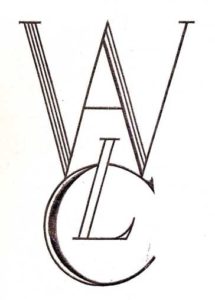
1939 Women’s Advertising Club of London WACL logo and letterhead 
December 1939 letter to WACL members announcing the decision to keep the Club going ‘on the basis of activities suitable for wartime’ and asking for donations for NABS - Began with ‘The Slump’ and ended with World War II
- 1940s
In the 1940s…
- War in Europe ends 1945
- War in the Far East ends 1946
- National Health established 1948
- Polo mints launched
The early 1940s were, of course, a very challenging time for everyone, WACL included.
One potential member’s invitation to become a member was deferred, as the Committee had learned that she was to be ‘called up’. Another member wrote to apologise for her recent non-attendance at meetings, giving her reason as “2,000 troops have recently been bivouacked in the field next to my house, and so my time has been spent running the WRVS canteen”. Those still able to attend meetings, established committees to discuss such important matters as: “the most useful way of putting women behind the war effort”.
Once the war was over on all fronts, WACL projects included research into “a woman’s place in industry”, but the serious post-war mood of the nation, together with ongoing rationing, meant that there were no Balls or expensive functions at all during this period.
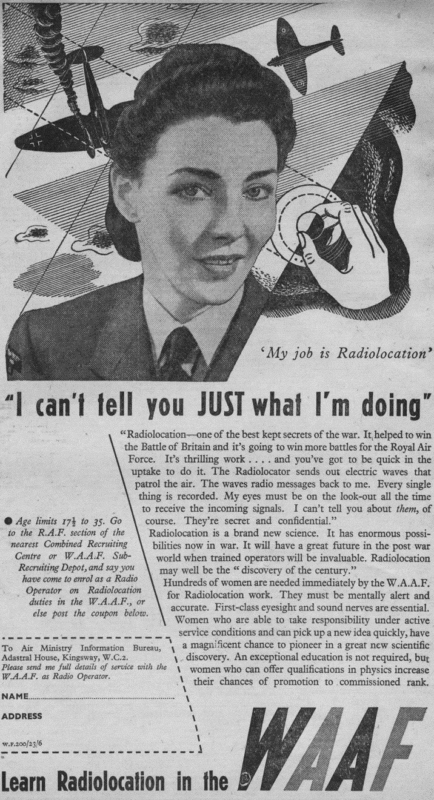
1941 press advert for women’s wartime job with WAAF in radiolocation - War in Europe ends 1945
- 1950s
In the 1950s…
- Coronation of Queen Elizabeth II
- Rationing finally ended 1954
- Commercial TV launched
- Alec Issigoni’s Mini appeared on the roads
- Stork margarine appears
WACL was finally able to re-establish its social programme by the early 1950s. By the time of its Ball to celebrate the Coronation in 1953, WACL had already established what became a long-standing tradition of holding some of its key annual events at The Savoy.
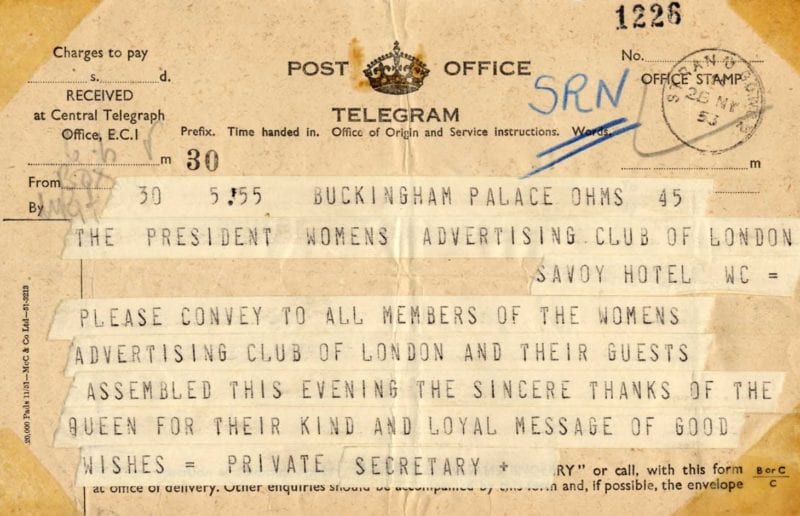
1953 telegram from Buckingham Palace thanking WACL for their ‘kind and loyal message of good wishes’ to the Queen and King 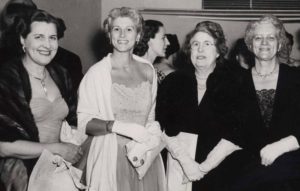
Black and white photo of four WACL members in black tie dress at the WACL ball in 1953 - Coronation of Queen Elizabeth II
- 1960s
In the 1960s…
- First Man in Space
- The Beatles phenomenon
- Swinging Sixties
- Concorde’s first flight
- Angel Delight launched
By the 1960’s, the progress of women’s ’emancipation’ was reflected in a number of WACL members having made it as far as management positions in top agencies such as WS Crawford, Saward Baker & SH Benson.
In 1961, the list of members included a Mrs A Wilkie, “Export Sales Representative” for Elizabeth Arden, and in 1964, our list of Associate Members included a Mrs J. Savage, Managing Director of ‘Savage Transformers’ (relationship to the comms industry unknown!) who could be reached by telephone at Devizes 932.
Reflecting the gradual opening up of the industry to women, in 1968, the Vice President’s project was stated to be the production of a ‘pamphlet’ entitled “Careers for Women in Advertising”.
In 1969 WACL welcomed as its speaker ‘the Right Honourable John Stonehouse MP; Postmaster General”, who informed members & guests that the Post Office’s spend on its telecommunications business had increased from £86,000 in 1966-7 to £960,000 in 1968-9: with the objective of encouraging customers to use their telephone more often, as some never made outgoing calls at all.
He also explained that, during their recent pitch process, 4 agencies had been nominated by staff and then he had chosen another 3 “after reminding myself of reputable names by looking through the London Classified Telephone Directory”.

WACL President (1959-60) Olive Hirst - First Man in Space
- 1970s
In the 1970s…
- The Three Day Week
- Decimal currency introduced
- A Clockwork Orange premiered
- Capital Radio and LBC became the first commercial radio stations
- Fry’s 5 Boys chocolate ‘retired’
The chaos that affected daily life during the era of industrial unrest at the beginning of the 1970s affected all parts of everyday life.
For example, January 1974, saw Club minutes stating that the planned annual Ball might need to be postponed “in view of the grave national emergency” – but happily, it did go ahead in May.
But, “in spite of the three day working week, threatened electricity cuts, and a shortage of petrol and transport”, WACL managed to retain a sense of contemporary style, offering to all guests at its 50th anniversary luncheon, a “Perspex Paperweight”.
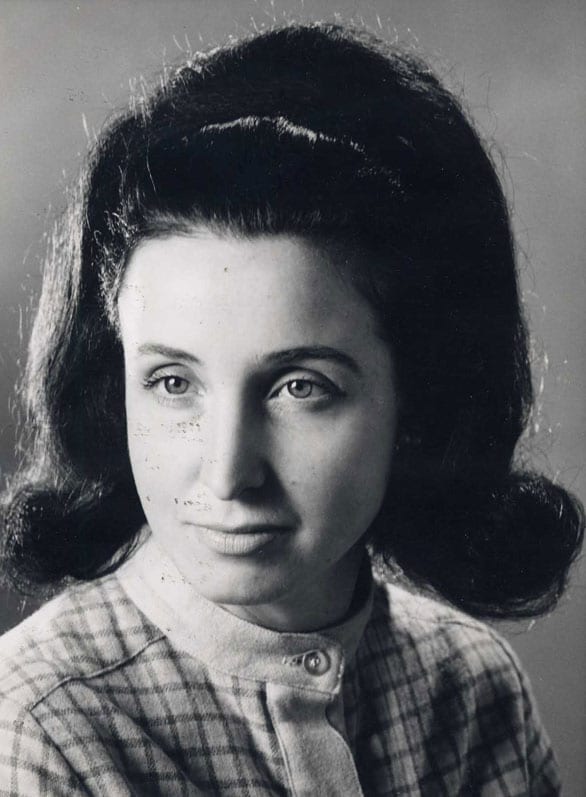
WACL President (1975-76) Joan Barrell - The Three Day Week
- 1980s
In the 1980s…
- Falklands War
- Privatisation of British Gas, BA
- ‘The Face’ magazine launched
- Wall Street the movie: “greed is good”
- ‘Countdown’ was Channel 4’s first programme
- Tim Berners-Lee invents the World Wide Web
With Mrs Thatcher being elected for a third term came an invitation for WACL to dine at No. 10. Lyndy Payne, the Club’s President reflected in her letter to Mrs T that it was a “very thrilling evening; I would not have missed it for the world”. When considering Mrs Thatcher’s experience, however, another member (Lorna Winstanley) did point out that the Iron Lady “unfortunately did all the talking and probably did not learn as much as if she had listened more”. Another member, on asking a member of Whitehall staff why Scotland had not been mentioned, was told: “Mrs Thatcher doesn’t like the Scots”.
For the first time in history, the Club also agreed to increase its maximum number of members from 50 to 60 and confirmed its objectives as:
- To facilitate an exchange of views between selected women in senior positions in advertising and related industries.
- To provide members with informal support, advice and consultation.
- To provide an exclusive forum to which members can bring clients, colleagues and friends
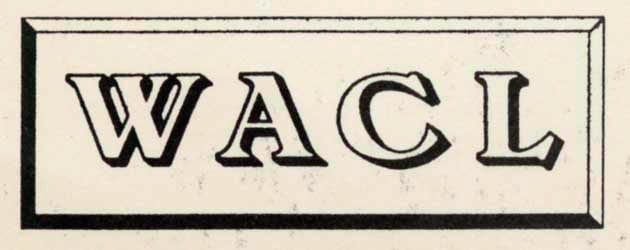
WACL logo from 1983 - Falklands War
- 1990s
In the 1990s…
- Nelson Mandela was freed
- The Channel Tunnel opened
- Mad Cow disease hit Britain
- Princess Diana died
- Google launched (1998)
- Good Friday Agreement signed
- Dolly the Sheep Cloned
In the decade that started in recession and ended in a dotcom bubble, Thatcherism gave way to Cool Britania and Britpop as the Spice Girls urged Girl Power.
WACL celebrated its 75th Anniversary by recognising 75 women of achievement over the previous 75 years (many of whom were WACL members) and planted 75 trees in Regent’s Park in their honour.
The Club also launched the first of what was to become an annual day of inspiration,training and mentoring for the next generation of WACL-ers, The Forum. It was the beginning of an important shift of emphasis for the club and its membership, and for the first time members officially committed “to provide inspiration and aspiration for women in our industry.” This tradition continues in the form of the Festival of Talent, the Talent Awards, Talent Sessions and Mentoring, ensuring that the emerging female leaders in the industry are nurtured and inspired.
Girl Power indeed!
- Nelson Mandela was freed
- 2000s
In the 2000s…
- The Millennium Dome was launched in the UK to celebrate the start of the 2000s
- Ken Livingstone became Mayor of London, the first directly elected mayor in the UK
- The Harry Potter film franchise began in 2001 and spanned the decade
- The 9/11 terrorist attacks in the US in 2001 provoked the ongoing ‘War on Terror’
- Communications were revolutionised through internet, web and mobile technologies
- There were 2 serious worldwide financial crises in the decade
- In 2009 Barack Obama became the first African American to become US President
- Carol Ann Duffy was appointed the first female Poet laureate (and the first Scottish and gay one too) in 2009
It was a decade of huge change and anxiety, but also a decade of breakthroughs for women, which WACL reflected. Our speakers included the first female CEO of a FTSE100 company (Dame Marjorie Scardino), the first female General from open selection across the British Army (Brigadier Patricia Purves), the first female Director of the Royal Institution (Baroness Susan Greenfield) and founder of S&A Foods, Perween Warsi.
Initiatives to support and inspire the next generation of female talent in the industry expanded from the annual Forum (later Gather, and now the Festival of Talent) to include regular workshops, and in 2003 the Future Leaders’ Award (now the Talent Awards) was launched, which rewards emerging female leaders in the industry with training bursaries to help them realise their leadership potential.
- The Millennium Dome was launched in the UK to celebrate the start of the 2000s
A century in the making
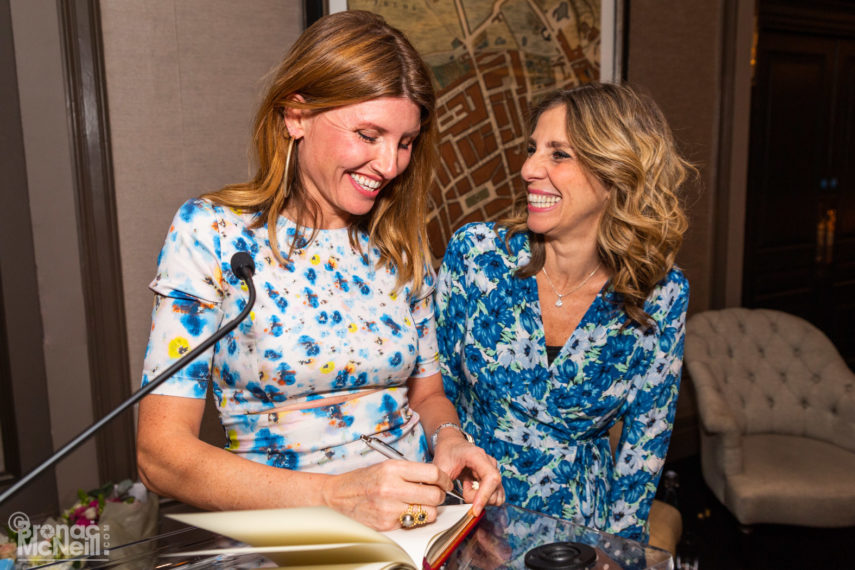
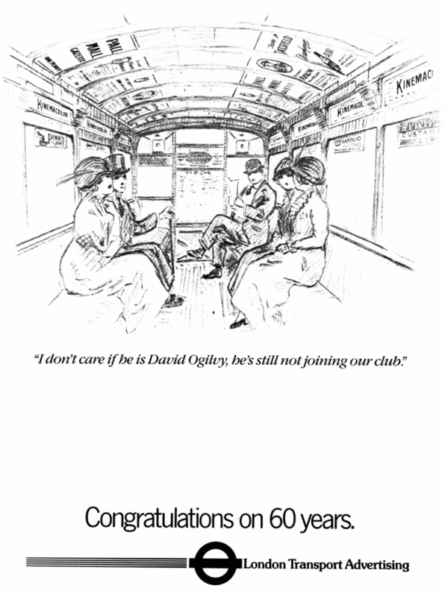
From polite dining club to world-leading network, WACL has a rich history of supporting and inspiring women in advertising
It usually comes as a surprise to people, that WACL was founded nearly a century ago in 1923. It also says something for that era that the Club was founded by men, for women! Its ‘Godfathers’, who forever retained the Club’s affection were, from the client side, Mr John Cheshire, MD of Lever Brothers, and from advertising Sir William Crawford and Mr CH Vernon of C Vernon & Sons.
The reasons for the founding of the Club were quite simple: firstly, a growing number of women were beginning to find their way into (non-secretarial) roles within the advertising industry, as saleswomen for advertising space, and as managers within advertising agencies. Even more importantly, however, a convention of the International Advertising Association was due to be held at Wembley in 1924. A significant number of the American delegates due to arrive were women, and at that time there was no organisation capable of organising the welcome for such women.
From such a relatively pragmatic beginning, WACL has grown in size, influence and status to the organisation it is today.
WACL’s extensive archive, comprising minutes, documents and photos, offers a fascinating example of women’s social history in Britain and is kept at the History of Advertising Trust.
History
2023: WACL’s Centenary year
WACL is 100 in 2023 and we have much to celebrate. WACL members have been at the forefront of the advertising and communications industry, and many of them were trailblazers for those of us who follow. We’ll be celebrating our Centenary by remembering their achievements, and also by looking to the future. Our ambition is to create a programme of initiatives that will support and inspire the generations that follow, creating a legacy for the next 100 years, that is just as impressive.

